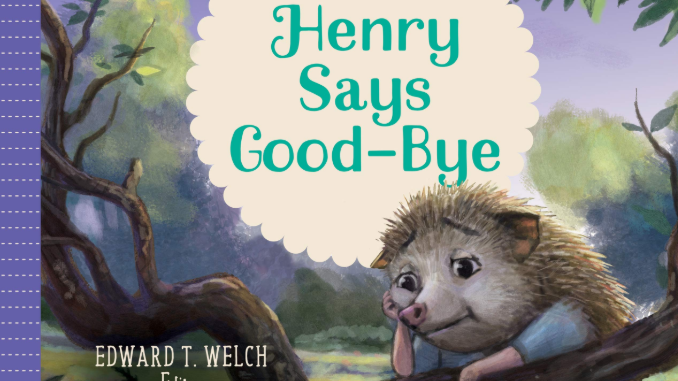
Also by this author: Tori Comes Out of Her Shell: When You Are Lonely, Gus Loses His Grip: When You Want Something Too Much
Series: Good News for Little Hearts #4
Published by New Growth Press on October 2019
Genres: Children's, Children's Educational
Buy on Amazon
Goodreads

Henry the hedgehog loves his pet ladybug. She keeps him company and entertains him, his family, and his friends with her flying tricks. But one day, he has to say good-bye to his ladybug. Henry and his whole family are sad, but they learn to go to Jesus with their sadness and ask him to comfort them.
The last page contains information for parents on how God, in his Word, helps us turn to Jesus when we are sad. Together children and parents will be guided into meaningful conversations about living by faith in the details of everyday life. Also included is a tear-out page of Back Pocket Bible Verses that will give children a practical way to remember God's words when they are sad.A new series of hardback, illustrated, Christian children's books for three-to eight-year-olds each centered on an animal family bringing gospel help and biblical counsel to families. The animal characters, colorful illustrations, and the real-life issues each animal family face will captivate children and help them begin a stronger relationship with Jesus Christ and God. The first three books address anxiety, anger, and failure, bringing biblical help and hope to issues every child faces.
Learning emotional control can be one of the most difficult things about early childhood (or late childhood…or adolescence…or adulthood). For little ones engaging with these emotions and these heart issues for the very first time, it can be a confusing and troubling experience.
Story, especially for our little ones, becomes a way to experience and understand certain experiences without needing to be in the middle of them. We learn how to respond to anger or anxiety or failure by seeing it modeled in other people—in our life stories—or in fictional characters. Children’s actions and responses are often modeled by the media they consume.
As such, it becomes very important to teach and model appropriate emotional reactions to our children. To help with this, the Christian Counseling and Educational Foundation has partnered with New Growth Press to develop and publish a series of children’s books meant to introduce such topics. The end result is Good News for Little Hearts, written by Jocelyn Flanders and illustrated by Joe Hox.
Henry Says Good-Bye
Henry is a hedgehog going through a sad time. His pet ladybug died. When the story begins, Henry is waking up to the happy sounds of his household, but he feels sad as he remembers the loss of his friend. In a flashback, we’re told about the good times the two spent together, and then how Lila the Ladybug died.
Henry Says Good-Bye doesn’t shy away from death. It doesn’t say “went away” or “passed away,” but very clearly uses the word “died.” The next pages are a natural reaction to that loss. Henry doesn’t want to eat; he feels confused, alone, and sad; even remembering good memories are a source of sadness.
The next day, Henry finds himself angry that his friends’ pets are still alive. To help him cope, Papa suggests a funeral of sorts, where all Henry’s friends share their memories of Lila. After this, Papa talks about the end of all pain and suffering with the return of Jesus.
Review
From a literary perspective, Good News for Little Hearts continues to be a mixed bag, not always understanding its target audience with its word choices. I’m also not sure I understand the culture of this universe…which animals get to be pets and which get to be the “people”?
Henry Says Good-Bye also suffers from some unintended lessons it doesn’t mean to teach. For instance, Henry gets in trouble when his pet escapes from his backpack at school. Not in trouble for bringing the pet, mind you, but for letting it out of his backpack. A quote from the book: “You know the rules: pets stay in their backpacks for classes.” Needless to say, teaching kids that pets go in backpacks and are definitely allowed at recess is probably not the best lesson.
From a counseling perspective, the book handles the idea of loss very well. The loss of a pet will—most likely—be a child’s first close dealing with death. The emotions Henry feels are natural and those around Henry handle his loss well. The parenting guide at the end gives parents a good resource for teaching their children about loss as well. While I have quibbles with the story, the lesson behind it is solid.
